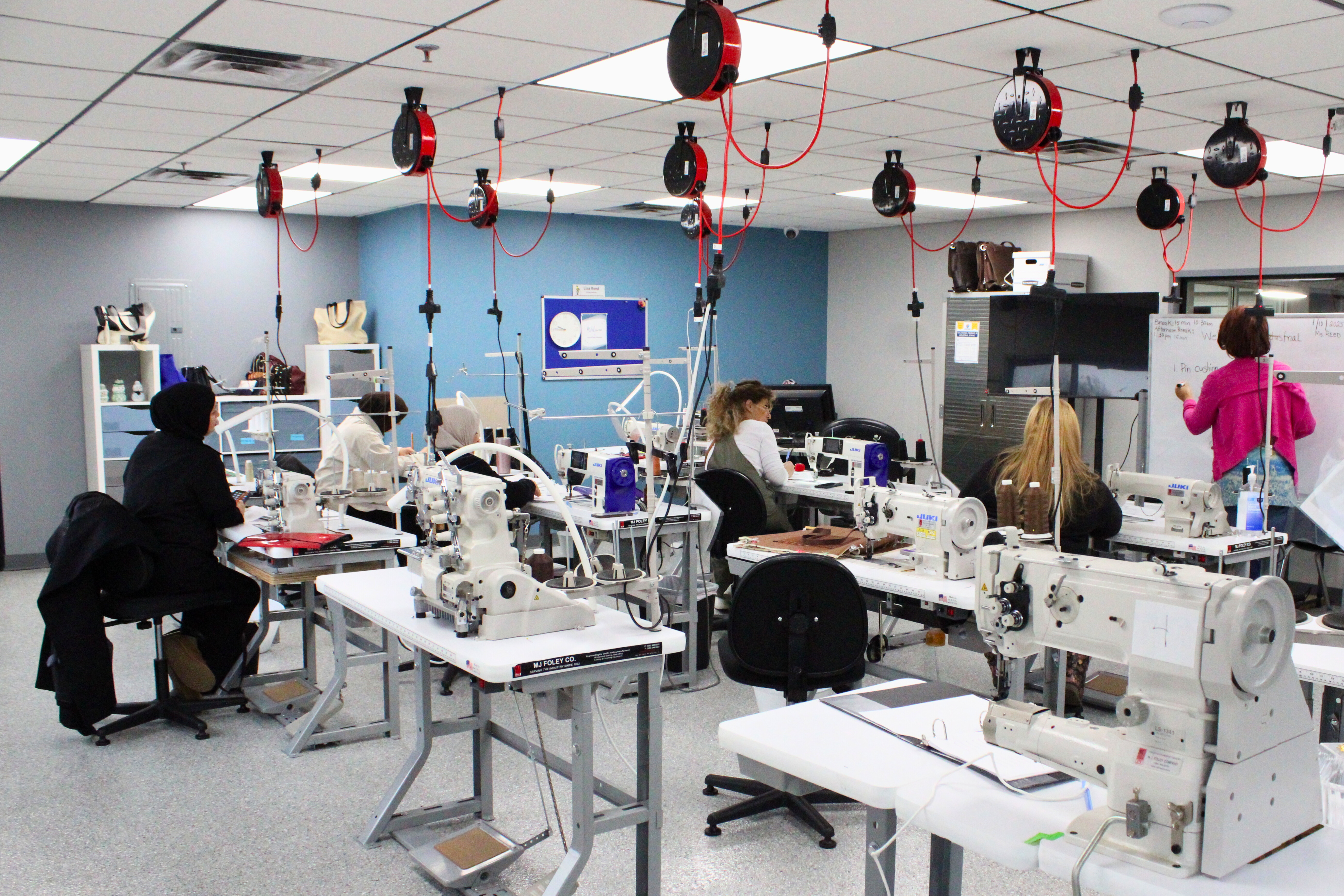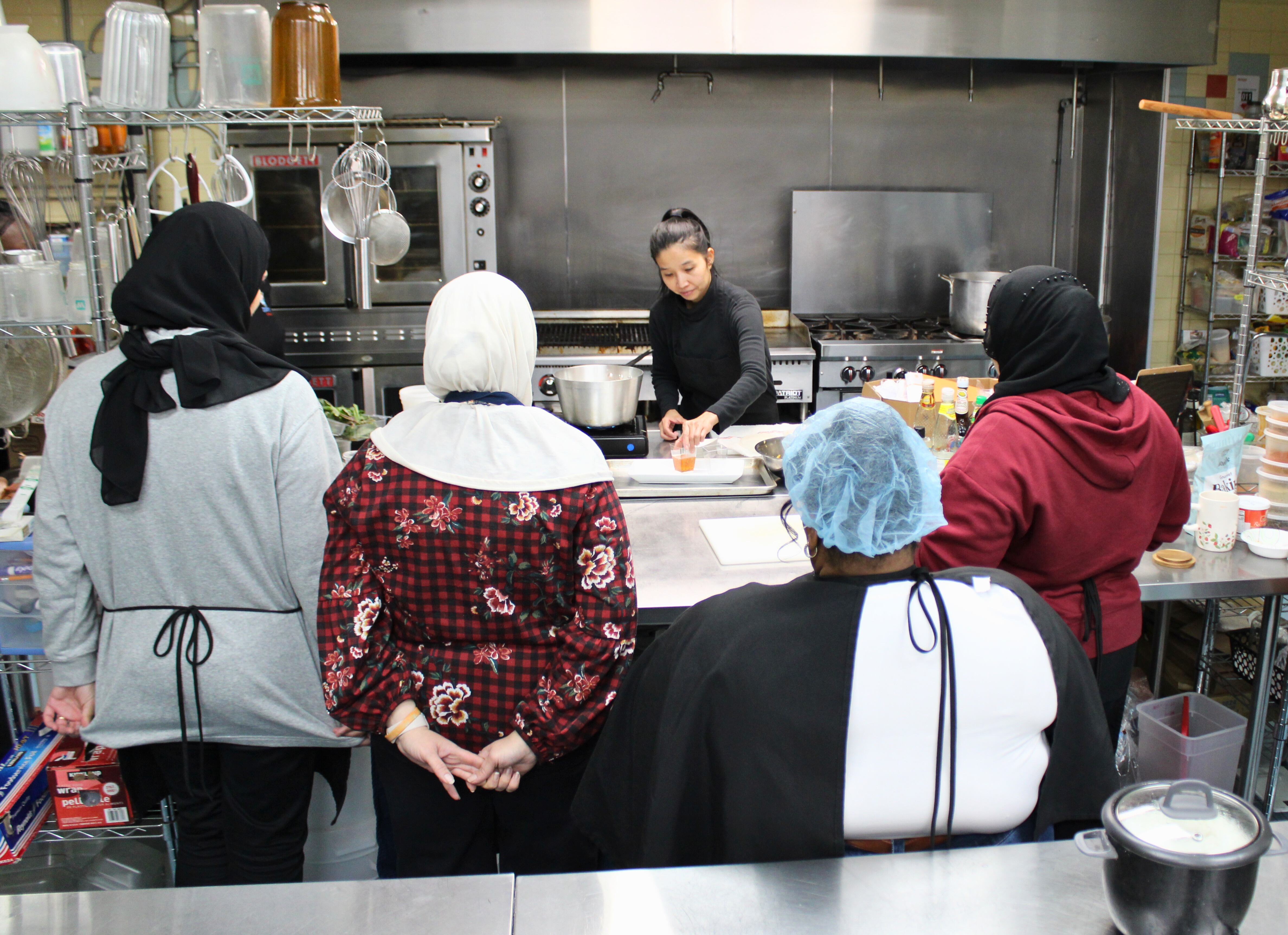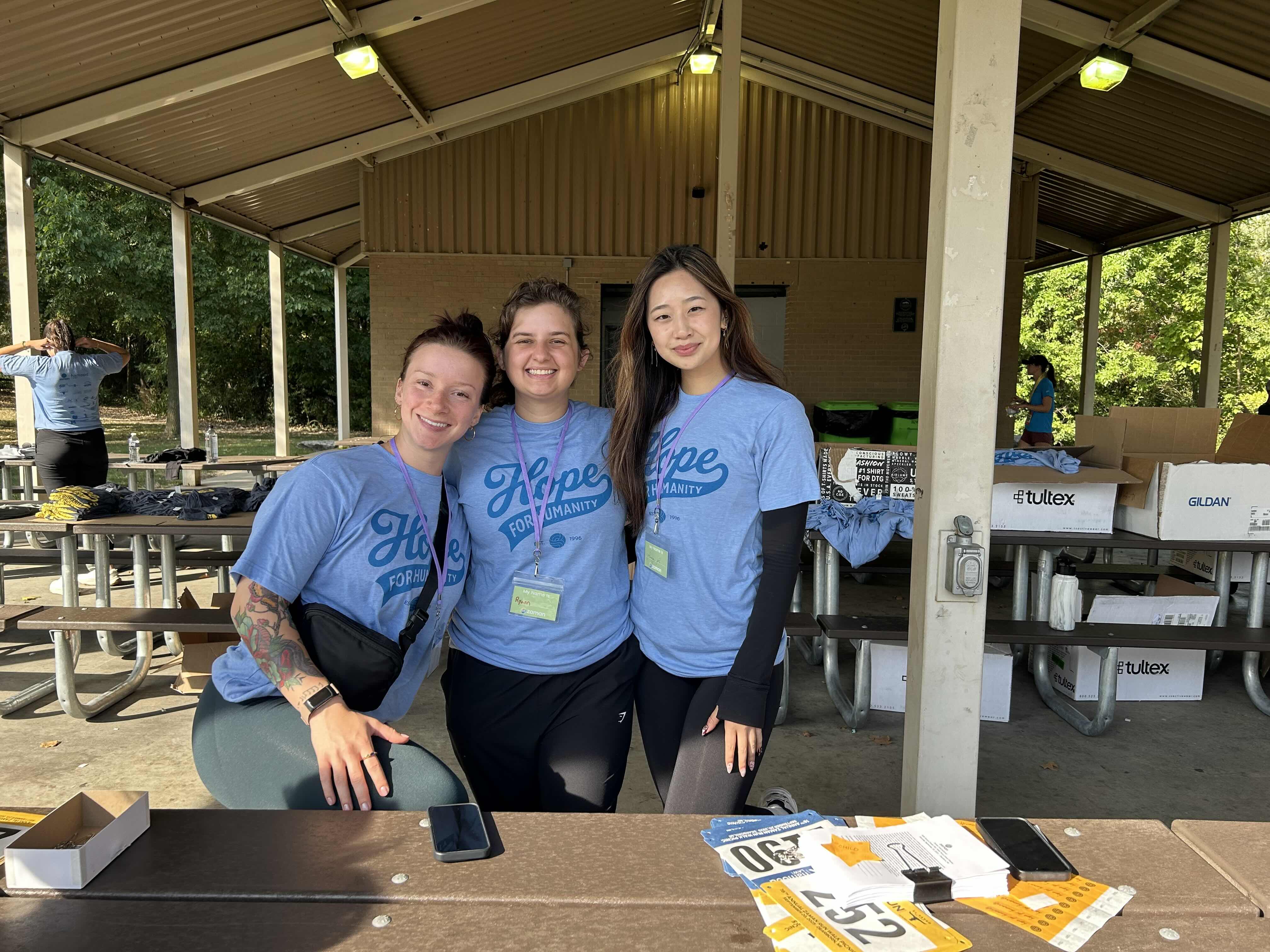Empowering Through Dignity: Zaman International’s Expanding Impact
Gallery

Kids run at the 16th annual Zaman International "Hope for Humanity" Run, Walk, Picnic, Sept. 20, 2025, Ford Field Park, Dearborn, MI
On Sept. 20, Zaman International hosted its 16th annual Run Walk Picnic at Ford Field Park with a turnout of over 1,000 attendees, who enjoyed freshly grilled food, a local food truck, horseback riding, a small petting zoo, and various other fun activities.
Among the volunteers were University of Michigan first-year pharmacy students Lanny Lo, Ryann Whalen, and Sophia Claymore. The students were encouraged by their dean to be more involved in local community services and to increase their volunteer opportunities. “We want to make an impact in the community; this is a small way to do that,” Lo said.
Sarah DeVeer, the Associate Director of Community Engagement, explained that the word “Zaman” in Arabic means “time” to remind others of their short time here on earth and how they choose to spend it. Therein came the name of Zaman International. DeVeer, who had moved to Michigan from out of state, was searching for a job and had found Zaman International, immediately falling in love with its mission. DeVeer had always found that her passion lay in mission-driven work. “It felt very much like a natural fit.” DeVeer said, “I mean, you can see my shirt: Hope for Humanity.” DeVeer explained, “The core of our mission in terms of action is our client program with Zaman that prioritizes women and children to get out of poverty.” DeVeer added, “Part of the action Zaman takes is through the entrepreneurship program, and English language skills, and a vocational school which incorporates all of that.”
At the very center of Zaman is its founder, a nurse who had witnessed struggle and poverty firsthand, as well as having experienced language barriers and systematic inequities, and how these had impacted marginalized women and children. In the beginning, Zaman had mainly focused their efforts on delivering food, household goods, and clothing to those who had been in a deeply urgent need. However, the organization quickly grew to reach heights far beyond crisis response. Chief Impact Officer at Zaman International, Monica Boomer said, “Our founder always had in mind that we would open a health center. And this is the result of that dream, made real.”
Touring Zaman International’s Hope for Humanity Center showcased the many programs the organization provides to help women and their families lift themselves out of poverty. Including their on-site health center, which opened in June 2024. This acts as a prime example of how Zaman built community trust. The women’s health center focuses primarily on serving women who have already been connected to Zaman’s client services, many of whom have historically prioritized their children’s wellbeing and health above their own. This act of selflessness had led to devastating consequences, such as fatal diseases like cancer going undiagnosed until it was too late.
Touring Zaman International’s Hope for Humanity Center shows the many programs the organization provides to help women and their families lift themselves out of poverty. Boomer shared the story of when a longtime supporter of Zaman, Hussein Siblini, co-owner of New Yasmeen Bakery and SAJ, unexpectedly and very generously donated time and money to help Zaman achieve its plans for the Hope for Humanity Center. Boomer explained, “He had just come back from a religious pilgrimage and said he wanted his giving to impact future generations. We told him, ‘We’d love to build a kitchen, maybe in 2022.’ He said, ‘I’m in… but I’m not waiting five years.’”
Siblini led a group of donors that helped Zaman complete major warehouse renovations in 2016 to open the kitchen for the culinary arts program and a bakery. Siblini took it upon himself to oversee every detail and to ensure the full amount was raised through various fundraisers. “He was here more than some of our staff,” Boomer laughed. “From sunup to sundown. And five months later, in October 2017, we opened our teaching kitchen.” Today, that kitchen serves dual purposes: culinary training and food production. It also supports Zaman’s “Product to Market” initiative, giving students entrepreneurial pathways. Boomer emphasized, “The kitchen isn’t just about cooking, it’s about dignity, skill-building, and economic independence.”
During the tour, the Mirror News also had the pleasure of meeting an international intern from Brunei who is participating in the U.S. Department of State’s Young Southeast Asian Leadership Initiative (YSEALI). The intern explained her journey that led her to Zaman, “I’m a tailor and run my own design company in Brunei,” she said. “I came to the U.S. to learn how to better support community-based tailoring and entrepreneurship. When I saw Zaman’s model, I thought, ‘This is perfect.’”
Zaman has two-year-long accredited industrial sewing and culinary arts training programs. Students who attend and undergo the culinary arts program graduate with ServSafe and Frontline Cook certifications. Students who attend the industrial sewing program often gain employment through Zamans’ on-site sewing factory or with partner employers. “It’s not just us saying they’re ready,” explained a Zaman staff member. “We’re accredited by the Department of Labor, and employers trust the quality of our graduates.”
When it comes to the grants and funds that Zaman receives, they intend to intentionally minimize the income and use of government funding and focus their efforts further on donations from foundations and corporate partners, and strategically use federal workforce funds when available. “We never want a program to vanish just because the funding disappears,” Boomer stated. “Our clients deserve consistency.”
The programs at Zaman are often focused towards helping women who are low-income and are refugees from countries such as Syria, Iraq, Afghanistan, and, as a result of recent events, Ukraine as well. The average student would be a single mother living below the poverty line, often earning less than $12,000 a year. Boomer explained, “Our average client is a mom with 2-3 kids trying to make it on less than half the federal poverty threshold.” She added, “Since COVID, the number of families we serve every month has quintupled.”
Zaman’s programs do not stop at education but also assist and coach their students in navigating the workforce once they graduate from Zaman’s programs. After realizing that their students would be a bit lost on how to navigate the workforce and find a job, Zaman began their Workforce Development Program. Boome explained, “Telling people, ‘You’re trained, go find a job!’ But they’d never worked outside the home before. They needed help building confidence, even learning how to advocate for themselves.”
Now, Zaman provides a career navigator program, post-training employment opportunities, and one-on-one employer advocacy. For example, when a culinary graduate was offered an inflexible schedule at the airport, Zaman successfully helped her negotiate for childcare-friendly hours. “It’s not just job placement. It’s career empowerment,” said Boomer.
Education has been a major part of Zaman’s approach. In the Literacy Center, students participate in hybrid classes that are tailored to their schedules, which aim to address personal barriers such as child care and transportation. The students there learn English, financial literacy, and digital literacy, often starting with basic skills like setting up a Gmail account or joining a Zoom meeting. Every semester, around 140 students attend, with an active waitlist. Students receive Chromebooks and help connecting to discounted internet, ensuring learning doesn’t stop at the classroom door.
This particular strategy also includes employer education. A long-time partner of Zaman, DO Apparel in Livonia, hires Zaman’s sewing graduates and has created adaptations for cultural and language barriers. DO Apparel had mentioned to Zaman that their graduates “are incredibly focused.” Boomer explained, “Even if they’re shy about English, they know every technical term. That’s been huge.”
Huda Apperal, or Sakina Scrubs was another establishment created by a graduate student from Zamaan International, mother of four, Huda Abusabha. Abusabha honed her business and sewing skills at Zamaan International where she found the strength, courage, and support to start a business selling scrubs and hijabs that accommodate the religious attire for muslim women in the medical field. Abusabha is also an author of the short novel “Take Control of Your Time,” a novel in which Abusabha shares what she learned at Zamaan International on time management as a mother of four and now business owner and author. The book is available as an ebook on Amazon Kindle. To learn more about Abusabha’s journey as a Zamaan graduate student, visit the Mirror News, “Sakina Scrubs and Nisa Scrubs-Breaking Barriers between Modesty and Career for Muslim Women.”
While on tour, Boomer mentioned the big elephant in the room as the Mirror News was brought around the establishment. That the main values taught to students who had mainly consisted of single immigrant mothers were cooking and sewing. “Wouldn’t this possibly be characterized as sexist?” Boomer asked rhetorically. “However, the reasoning for this is that these are the skills that the women who come to us are familiar with and skills that they need to survive and support themselves and their families. We ensure that they establish skills where if something happened and they had to drop everything, they could take these skills with them until they were back on their feet.” Which, despite common misconceptions and sexist stereotypes, is indeed true and certainly necessary skills for the means of life and survival.
Zaman’s growth and story are a testament to its mission of bringing hope to humanity. From a small group in the back of a van to a full-fledged international humanitarian organization, Zaman is helping women and their families rise out of poverty through gaining lifelong skills. Before 2010, Zaman had operated out of half of a dentist’s office in Dearborn, Michigan. In 2010, Dr. Nader Bazzi donated the entire office to Zaman. “He told our founder, ‘Zaman needs a home.’ A week later, he handed us the keys,” Boomer shared. “We were rent-free there until 2016. That changed everything.”
Now Zaman is headquartered in what used to be an empty warehouse in Inkster, which has been transformed into the Hope for Humanity Center. Zaman offers a thrift store, food pantry, English classes, job training, and much, much more.
“We realized that if we make clients go to five places for services, they often give up,” Boomer said, “They need childcare, transportation, translation… and trauma-sensitive support. Having everything here helps them succeed.”
For more information on Zaman International, go to: zamaninternational.org.



